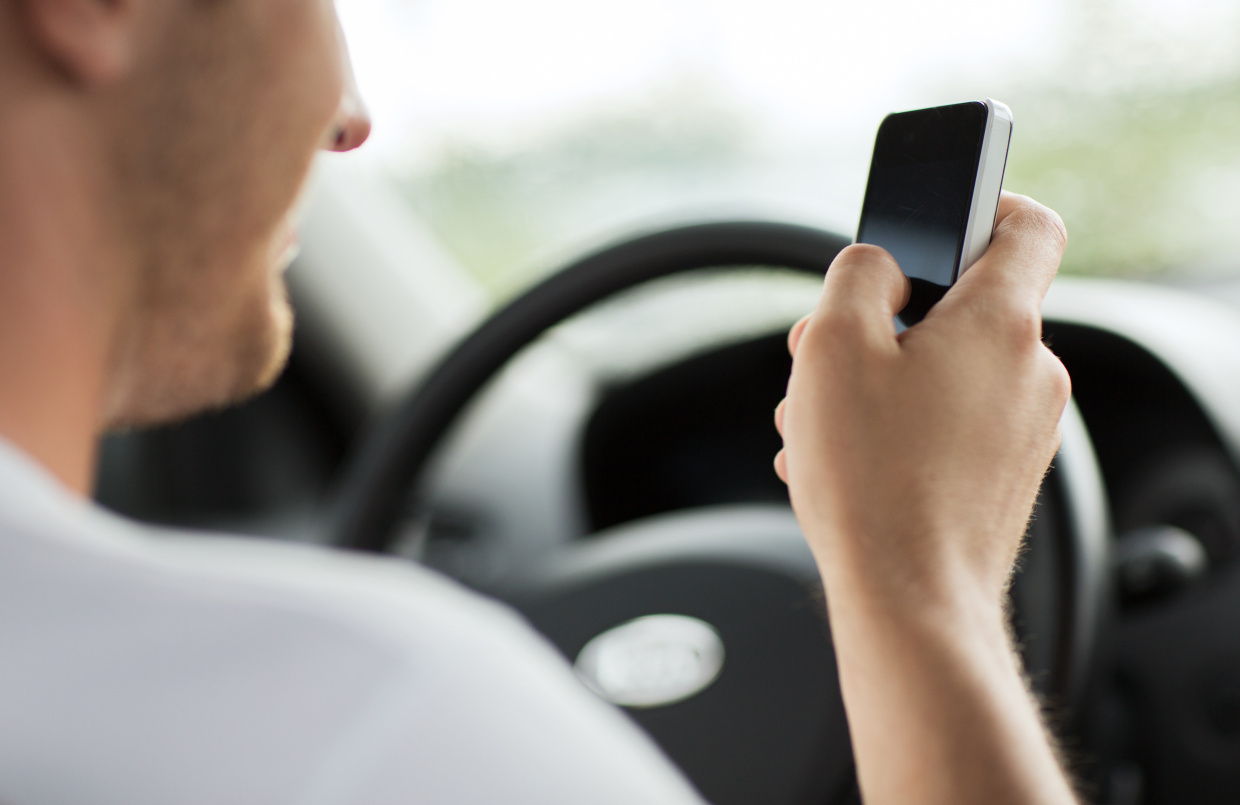Do you have a Utah driver’s license? If so, you’ll definitely want to read this.
As of May 13, 2014, 352 new laws took effect in Utah and are now being enforced. One law in particular that Utahns ought to know about seeks to separate drivers from their cell phones (at least while operating a moving vehicle) and imposes up to a $100.00 fine per violation.
Without question, cellular devices have created very serious problems for everyone, especially law-makers. Personally, I see the problem on a daily basis, to and from work, and even read about it online and in newspapers. In April of this year, a North Carolina woman died just moments after texting, “The happy song makes me HAPPY!” This status was uploaded just one minute before a frantic 911 call was placed describing the driver’s car having veered right (actually, left) into oncoming traffic and hitting a truck head-on. She died upon impact. Ironic does not begin to explain this, nor does calling the situation “unnecessary and sad.” Something needs to be done, that much is clear, so Utah legislature has enacted a new law (really a modification to the one already existing) to make an attempt.
THE NEW LAW: Utah Code Ann. Section 41-6a-1716. Prohibition on using a handheld wireless communication device while operating a moving motor vehicle
Under this rule, Utah drivers are prohibited from using a “handheld wireless communication device” to manually write, send, or read a written communication while operating a movingvehicle on a highway. Since the law was enacted, law enforcement has been pulling hundreds of cars over and “educating” them on the new law. The time for law enforcement to be “educating people” about the law is now over. Now, they will be enforcing it.
Understanding the Law
Here are 5 things you absolutely need to know about the new cell phone law:
1. The law only prohibits manually writing, sending or reading text messages or data.
You will want to notice the emphasis I make on the word “manually.” The restriction is on manipulating your cell phone to write, send, or read, and includes instant messages, electronic email, accessing the internet, viewing images, and capturing or recording images or video. Under this new law drivers are specifically prohibited from even dialing a phone number. I’ll be the first to claim that my phone allows me to “direct dial” by just hitting one button to dial out. Can I do that? “Did you dial your wife sir?” “Yeah, but I direct dialed. It’s simple.” Under the new law, you may have a defense if you are like me, but you’ll also have the citation. The better answer (as described below) might be, “Yeah, but I voice dialed her. Here, watch: ‘Siri, call wife.’ Look officer, it’s dialing!” If you voice dial or use any hands-free or automated method, you’re violation free.
2. The law applies to all “handheld wireless communication devices,” not just cell phones.
To be clear, a “handheld wireless communication device” is not just a cell phone. Sure, it’s a bit fancy and generally serves as a proper, technical term for a cell phone, but also includes anything substantially similar to a cell phone that can be used to write, send, receive or read text or data. Point two, don’t be fooled into thinking that you can “trick” cops just because it’s not a cell phone, the definition is very encompassing.
Don’t get me wrong, I’m not saying you can’t trick cops, just that you probably shouldn’t (for obvious reasons). In 2008, California enacted a strikingly similar law restricting drivers from using cell phones while driving. Following the enactment, Randy Liedtke, a California resident and comedian, took to the streets to test the new law. In his own words, Randy said, “I baked some iPhone cookies to trick cops into pulling me over, then [when I am pulled over and the officer approaches] I just take a bite and ask if cookies are against the law.” I’ll admit, the guy has taken the right career path, and that it’s completely legal to drive around with cookies. I wouldn’t, however, be surprised to hear that he was arrested (although, factually I do not think he ever was) for something different but not completely unrelated to the stunt. Trick cops at your own risk, but I’m not recommending it here. For one, I’m sure Los Angeles cops have much bigger fish to fry than comedians. I’m not sure the same holds true in many parts of Utah.
3. The law only prohibits “writing, sending, or reading text or data” while operating a moving motor vehicle on a highway.
For point number three notice there is an emphasis on “moving vehicle” and “highway.” First, if you are not operating the vehicle and moving, the law does not apply to you. Legally speaking, the law does not prohibit you from using your device while stopped. The law does not, however, specifically address whether this permits you to use your device to “write, send, or read” while at a stop sign or red light. I suppose time will tell, and I will almost certainly be making such a defense for future clients, but if you choose to use your cell phone while operating a vehicle be sure you can say definitively that you were not moving.
Realizing that what I am about to say next will have a devastating effect on countless Utahns across the entire State, heed my advice that taking “selfies” from behind the wheel is now a definite no-no. A photo from the driver seat (at least one that suggests the car is moving) can likely lead to a conviction and a fine. Believe it or not, social media has become a large part of the legal world and plays an integral part of investigations everywhere. Under the new rule, a photo on facebook, twitter or instagram, might be more than sufficient proof of your guilt.
As for the second emphasis, don’t let the term “highway” mislead you. The term “highway” should not be understood to pertain only to major highways and freeways, it is far more broad than that. To the law, highway is defined as “the entire width between property lines of every way or place of any nature when any part of it is open to the use of the public as a matter of right for vehicular travel.” Highway would be best interpreted to mean “anywhere” with exception to what is private property, like someone’s yard, driveway or perhaps a private parking lot. Clearly, I’m not suggesting you reserve all of your texting while driving for when you are driving on your neighbor’s yard, or that if you are taking a “selfie” while driving to do it in a parking lot. I’m not saying that. I’m just saying you probably won’t be cited under this law if you do.
4. There are exceptions to any rule, and this law is no exception. To be exact, there are seven exceptions.
The majority of the exceptions are involving “emergency calls,” but since you may need to know them at some point, so that you have a prepared response for why you were “writing, sending, or reading” on your “handheld wireless communication device” while operating a “moving” vehicle, here they are:
The law does not prohibit you from using your cell phone:
1) When using a handheld communication device for voice communication. (Yes, you can hold the phone to your ear, so long as you didn’t manually dial the number!).
2) To view a global positioning or navigation device or a global positioning or navigation application. (Yes, you may use your device for GPS purposes).
3) Use of the device during a medical emergency. (Of course you can call 911).
4) When reporting a safety hazard or requesting assistance relating to a safety hazard.
5) When reporting criminal activity or requesting assistance relating to a criminal activity.
6) When using the device via any hands-free or voice operated technology or a system that is physically or electronically integrated into the motor vehicle. (This is the way of the future, hands free = violation free. It may be time to relocate the hands-free device your phone originally came with and use it).
7) When used by a law enforcement officer or emergency service personnel acting within the course and scope of the law enforcement officer’s or emergency service personnel’s employment.
5. Under the new law a violation can carry a significant fine, with the possibility of jail time.
While jail time is not likely to result from a violation under the new law, you ought to know that it can. If you are stopped and the officer believes you have violated this new law, you will be cited with a Class “C” misdemeanor, subject to a maximum fine of up to $100.00.
If an accident results from the violation or you are convicted of violating this law two or more times within any three year period, you will be cited with a Class “B” misdemeanor, which is punishable by fine up to $1,000.00 and up to 6 months in jail. Depending on the egregiousness of your violation and the facts and circumstances of your case, jail time can be ordered.
Reading Between the Law: How will this affect me?
For many of you the effects of this new law are as obvious as is the theory behind it, which is very simple, sound even — to save lives. The result, and perhaps the more silent effect, however, is the new, shiny set of “probable causes” created that will give law enforcement more power than ever before to pull people over, and with relative ease. Because nearly everyone has a cell phone, if they see you with it at all they may just pull you over “to get a closer look” or to investigate. “Sir/Ma’am, do you know why I pulled you over?” If you thought that was a difficult question before, just wait until you hear it now. Even if they are mistaken, say you are displaying your freshly baked,”cookie iPhone 5,” you just gave every officer within sight the unfettered right to pull you over and take a closer look inside, and possibly, to search for your cell phone.
A ticket and/or subsequent arrest may not be the result of the stop, especially if it’s just a cookie, but Utah police officers will nonetheless get to detain you under theory that they are “saving lives” in the process. So, you’ll want to be sure to have your displayed cellular device (cookie or not) ready in hand, as I am certain that if you don’t (say you decide to hide it), you can expect to hear this: “Everyone out of the vehicle, we’re going to have to conduct a search.” Having seen you with a cell phone, mistake or not, under the new law there is probable cause to look for one if it is not readily seen and/or provided.
For most of us, this new law means nothing more than a greater likelihood that we will be detained at some point and perhaps inconvenienced for a bit as long as we are law-abiding. For others, the theory of “saving lives” and restrictions on the use of cell phones will almost certainly replace the previous, most frequent set of “probable causes” to pull you over (“you have a tail light out” or “you didn’t signal”) and serving as law enforcement’s new, better ploy to detain suspicious drivers and other occupied vehicles to allow them “a closer look,” just to see what they can see, and of course, who they can bust.




Leave A Comment